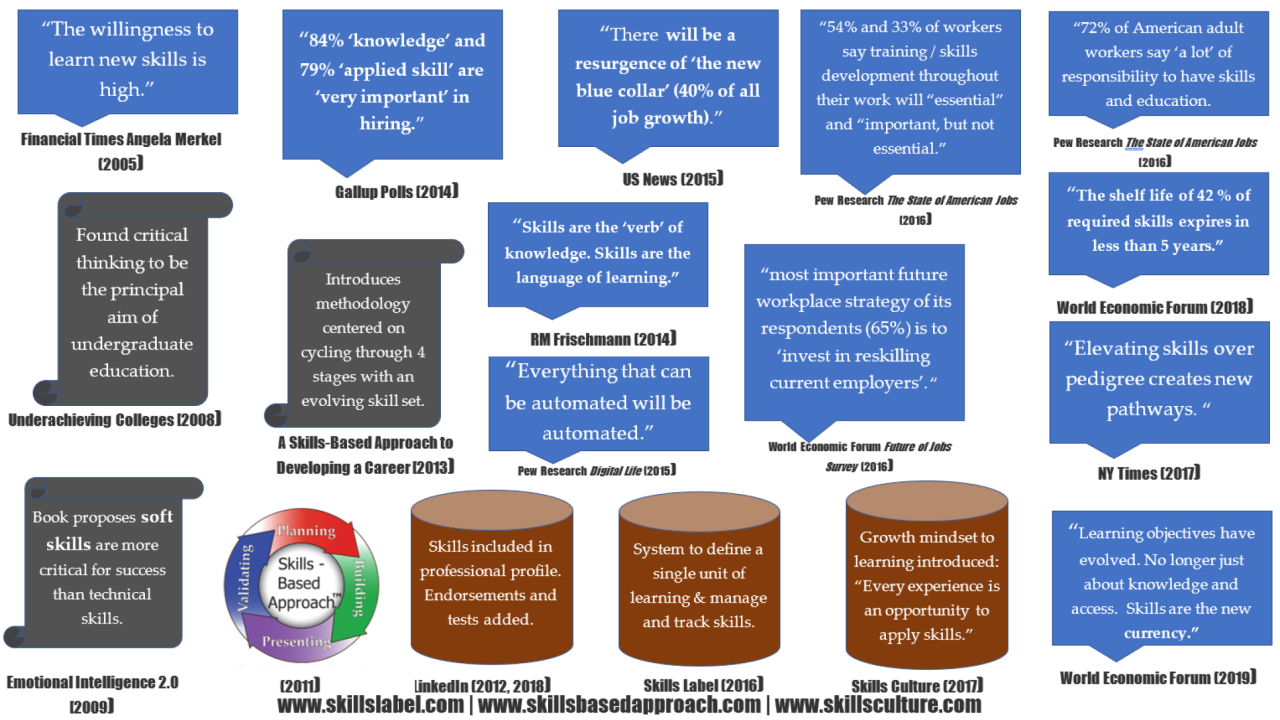The other day, I told someone how my team's system to manage and track skills should be relevant in 10 to 20 years from now. With the huge influence of AI and related technologies, I get skittish on making bold predictions with technology and learning.
Skills and underlying methods, standards, and competencies (a measurement of skill like Skill Points ® 2.0) should be the foundation for how we define learning (education, higher education, and training), forecast workforce demand, and prepare for jobs and careers. Here is some of my reasoning:
Workers will need to agile in 2030, so be willing to re- and up-skill. The current shelf life of 45 percent of skills is less than 5 years. So, we need to understand how to keep skills current and define learning in skills. Create shorter, nimble learning paths, designed to use all different types of resources. The current traditional degree and certification models probably do not work fast enough (though the same institutions will offer new accelerated programs). Almost on point, this weekend I glanced over a headline suggesting recruiters are rethinking how to hire for skills as opposed to degrees.
Students and workers use technology to augment the retrieval of ‘facts and information’ in 2030, so skills are more relevant in scaling knowledge. Human skills, like thinking (analytical and critical) and communication (listening, conversing, and teamwork) skills, are particularly valuable. Advanced technical skills will be needed to keep contributing to better systems. Been making this argument for a long time, skills are the ‘verb of knowledge’.
There will be constant churn in the demand for technical skills in 2030. One organization claims a current database of 30,000 skills. Maybe there are a few hundred thousand skills in a 2030 database. Many of the jobs and skills in 2030 do not exist today. Working in the medium of skills is more agile than degrees.
Start seeing the fruits of labor with education and training standards (rooted in skills) in 2030. Education and training standards are largely based on skills and there are now systems to keep adding new standards, creating a cascading, layering effect. By 2030, education publishers, game and virtual reality creators, and trainers better align their resources to skills and related standards.
Static representations of education and professional experiences (like a resume, degree) are replaced with dynamic ones in 2030. (I think) there will be something like a scorecard to show a person’s complete skill set with a competency (level of achievement); this is like tallying Skill Points® for each skill - like our current Skills Emblem. E-portfolios and personal websites showing work experience and projects prove skills competencies and mastery of subject matter.
One reason why I continue to promote our skills based platform is because I think it could around in the next decade. Like with many standards and frameworks, it might be a matter of what one gets chosen.
I make three strong arguments in support of the learning label system (why it is patent allowed):
- Skill Points. Numerical representation of learning expectations and job requirements.
- Multiple Skills. Suggests in any given experience, a number of skills are being applied. (Works whether or not the attention should be on a single skill.)
- Linking Job Skills to Learning Skills. Same skills on a resume, personal website, or profile are on the learning definitions.
And there are two current trends supporting these claims: point systems are already in games and learning (though they tend to focus more on abilities rather than skills); and the release of a few large open source skills databases (to go along with a number of proprietary ones). Open source databases are a precursor for future uses.
This is why my team is adamant in building awareness of our skills system, why it is built as a series of apps across platforms and devices, and why we pursued the patent. Learn more on our website: www.skillslabel.com
